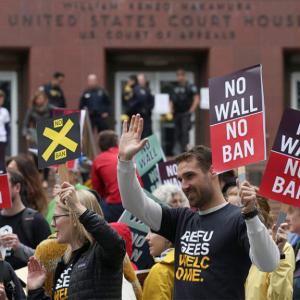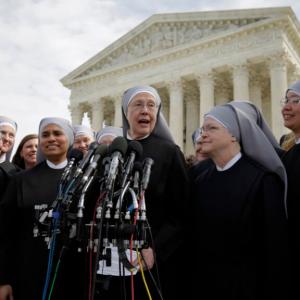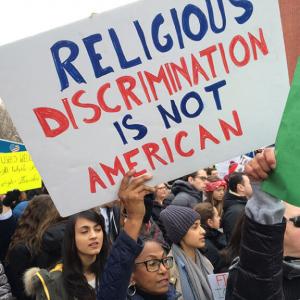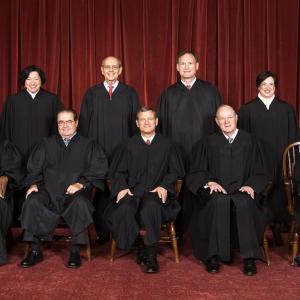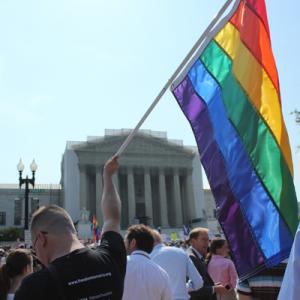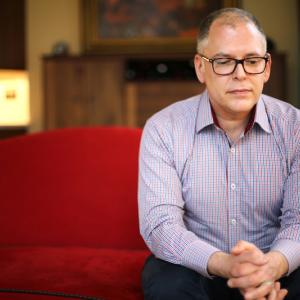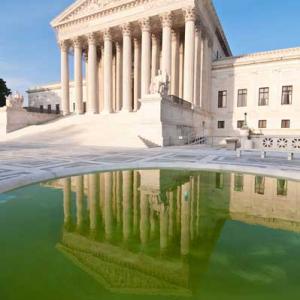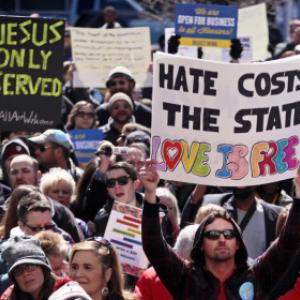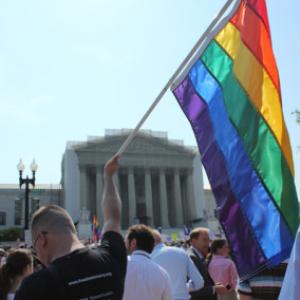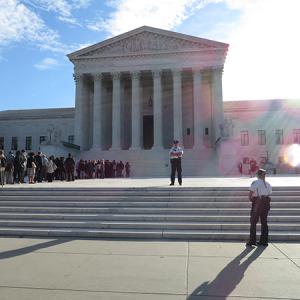Richard Wolf writes for USA Today.
Posts By This Author
Trump Administration Asks Supreme Court to Reinstate Travel Ban
The Justice Department asked the Supreme Court to break its losing streak in lower courts and revive President Trump’s travel ban on immigrants from six predominantly Muslim nations.
The request came on June 1 in three separate petitions to courts in Richmond, Va., and San Francisco that blocked the president’s executive order barring most immigrants from countries deemed at risk for terrorism, as well as international refugees.
Trump Administration Reversing Obamacare’s Birth Control Mandate
While not yet final, the regulation appears intended to let employers avoid providing birth control coverage if they object for any reason — an expansion of the original effort to exempt those with religious objections. As a result, abortion rights groups warn that up to 55 million women could lose free birth control coverage — something that saves them $1.4 billion annually.
Appeals Court Rules Against President Trump’s Revised Travel Ban
A federal appeals court in Richmond has delivered yet another blow to President Trump’s effort to institute a travel ban targeting six majority-Muslim countries, making a final Supreme Court showdown more likely.
The full U.S. Court of Appeals for the 4th Circuit ruled 10-3 on May 25 to uphold a lower court’s decision that barred the Trump administration from implementing its second attempt at the travel ban.
Supreme Court Seeks Compromise in 'Contraceptive Mandate' Cases
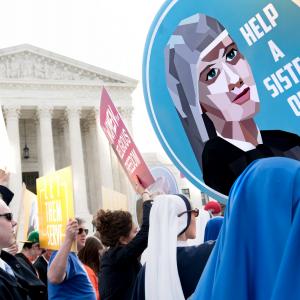
Image via Victoria Pickering / flickr.com
The Supreme Court is seeking a compromise that would let religious nonprofit groups avoid any involvement in offering insurance coverage for contraceptives while also ensuring that employees get the coverage.
Texas Abortion Case Goes Before Short-Handed Supreme Court
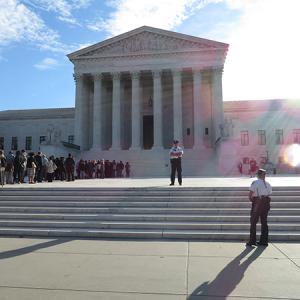
Image via Lauren Markoe/RNS
The Supreme Court takes up its most far-reaching case on abortion rights in nearly a quarter century March 2, with the fate of abortion restrictions in many states on the line. Depleted by the death last month of Justice Antonin Scalia, the eight-member court will consider a challenge mounted by Texas abortion clinics against a law that threatens to leave only 10 clinics operating in a state with 5.4 million women of reproductive age.
Justice Scalia's Funeral Set for Saturday
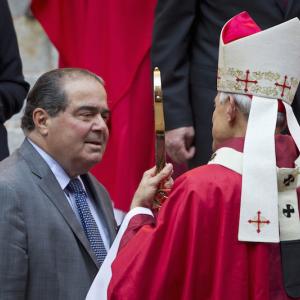
Justice Antonin Scalia with Cardinal Donald Wuerl. Image via REUTERS/Benjamin Myers/RNS
Supreme Court Justice Antonin Scalia’s funeral will be held Feb. 20 at the Basilica of the National Shrine of the Immaculate Conception, the largest Roman Catholic church in North America, according to media reports. The late justice will lie in repose at the Supreme Court on Feb. 19, following in a tradition last observed after the death of Chief Justice William Rehnquist in 2005.
How Scalia’s Death Affects Key Cases Before the Supreme Court This Year
The death of Supreme Court Justice Antonin Scalia is a major setback for the conservative legal movement, as will become clear in the months ahead.
This was to be the term conservatives roared back after one in which the court’s liberal bloc won most of the important cases, such as same-sex marriage and Obamacare. On tap to be decided in the next four months are cases affecting abortion rights, affirmative action, voting rights, the power of labor unions and President Obama’s health care and immigration policies — and conservatives stood at least a chance of winning them all.
Supreme Court May Wade Back Into Abortion Debate
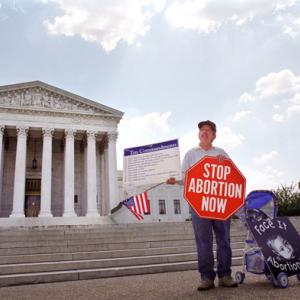
Image via Ryan Rodrick Beiler / Shutterstock / RNS
Nearly a quarter-century after its last major ruling on abortion created a fragile balance between women’s rights and government restrictions, the Supreme Court appears ready for a rematch.
And like the last time, the debate would unfold in the midst of a presidential election.
The first act could play out as early as Nov. 13, when the justices may decide whether to hear a challenge to tough new limits placed on abortion clinics and doctors in Texas. The restrictions — forcing doctors to have admitting privileges at nearby hospitals and requiring clinics to measure up to outpatient surgery centers — threaten to leave the state with just 10 clinics clustered in four population centers and along the Mexican border.
Obamacare's 'Contraceptive Mandate' Faces New Challenge in Supreme Court
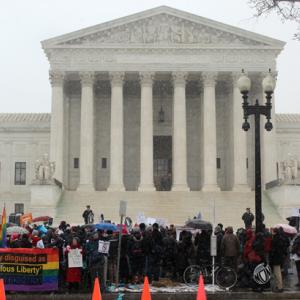
Image via Adelle M. Banks / RNS
Sixteen months after ruling narrowly that companies with religious objections cannot be forced to pay for employees’ contraceptives, the court faces a chorus of cries from religious charities, schools, and hospitals seeking to get out of the birth control business altogether.
The justices are scheduled to review several petitions Friday asking them to overturn federal appeals court decisions that would force the non-profit groups to opt out of the “contraceptive mandate” included in the Affordable Care Act, rather than receiving the blanket exclusion granted churches and other solely religious institutions.
If they agree to hear one or more of the cases, it will mark the fourth time in five years that President Obama’s prized health care law has come before the high court. And it will put the battle between religious freedom and reproductive rights front-and-center in next year’s presidential race.
Supreme Court Says Kentucky Clerk Can't Deny Same-Sex Marriage Licenses
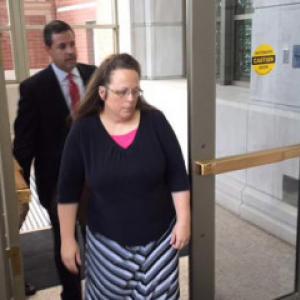
Image via Mike Wynn / The (Louisville, Ky.) Courier-Journal / RNS
The Supreme Court refused Aug. 31 to let a Kentucky county clerk deny marriage licenses to same-sex couples because of what she said were her religious beliefs.
The ruling, made without comment or any apparent dissents, is an early indication that while some pushback against gay marriage on religious grounds may be upheld, the justices won’t tolerate it from public officials.
Supreme Court: U.S. Passports Must Say ‘Jerusalem’ Not ‘Israel’
The Supreme Court on June 8 declined to insert itself into the middle of the Israeli-Palestinian issue by second-guessing U.S. policy on Jerusalem.
Ruling just a few months after a feud between President Obama and Israeli Prime Minister Benjamin Netanyahu, the justices refused to allow Americans born in Jerusalem to have their passports changed to reflect Israel as their birthplace, as Congress demanded more than a decade ago.
In denying the challenge waged by the Jewish parents of a 12-year-old almost since his birth in 2002, a majority of justices heeded the State Department’s warning that a simple passport alteration could “provoke uproar throughout the Arab and Muslim world.”
Supreme Court Boosts Workers Who Claim Religious Bias
The Supreme Court ruled June 1 that companies cannot discriminate against job applicants or employees for religious reasons, even if an accommodation is not requested.
The decision was a defeat for preppy clothier Abercrombie & Fitch, which refused to hire a Muslim girl in 2008 because she was wearing a black hijab, or head scarf. It could benefit job applicants and employees who need time off for religious observances as well as those who adhere to strict dress codes.
Lessons from Massachusetts on Gay Marriage — and Divorce
Same-sex marriage is so last decade in Massachusetts. These days, the earliest pioneers in gay and lesbian matrimony are demonstrating how to raise kids, retire — even divorce.
As the Supreme Court wrestles with what Chief Justice John Roberts last month labeled a redefinition of marriage, the couples who successfully challenged the Bay State’s ban on gay marriage in 2003 are juggling work and retirement, raising kids who turn down Ivy League colleges, and holding joyful family reunions.
Gay Marriage Fight Centers on What’s Best for the Kids
It is perhaps the most controversial component of the national debate over same-sex marriage: Who should raise children?
The judge who wrote the decision upholding gay marriage bans in four Midwest states gave at least some same-sex couples a shoutout last fall, even while ruling against them. His ruling is being appealed to the Supreme Court, which will hear oral arguments April 28.
Judge Jeffrey Sutton’s words have done little to quell the war of statistics and academic studies that has raged for years over the relative child-rearing skills of gay and straight parents.
Dozens of briefs submitted to the court cite scores of scientific studies on the subject. Some show that children raised in same-sex households fare no worse than those raised by mothers and fathers. Others say the differences are stark in areas ranging from emotional development to high school graduation rates and success at work.
The judge who looked most closely at the two sides’ arguments wasn’t Sutton but U.S. District Judge Bernard Friedman, who conducted a two-week trial last year to consider April DeBoer and Jayne Rowse’s lawsuit against Michigan’s gay marriage ban. He came down firmly on the side of studies showing no difference between gay and heterosexual child-rearing.
Researchers claiming negative outcomes for children of same-sex couples “clearly represent a fringe viewpoint that is rejected by the vast majority of their colleagues across a variety of social science fields,” Friedman wrote.
While rejecting the “fringe” label, some conservatives acknowledge that sufficient research has not been done to show that same-sex parenting harms children’s development. They contend the question remains open to debate.
5 Arguments to Watch as the Supreme Court Considers Gay Marriage
State bans on same-sex marriage have been justified based on judicial precedent, states’ rights, regulating procreation, optimal child-rearing, and centuries-old tradition. Those reasons also have been loudly debunked.
When it convenes April 28 for one of the most historic oral arguments in its 226-year history, the Supreme Court will hear all of those arguments and more from five lawyers representing gays and lesbians on one side, and the states of Kentucky, Michigan, Ohio, and Tennessee on the other. But the justices also will have read what dozens of federal trial and appeals court judges have written.
Here’s a look at five major arguments cited by those appeals court judges in their rulings. In addition to the four Midwest states whose bans were upheld, the circuit courts struck down similar bans in Idaho, Indiana, Nevada, Oklahoma, Utah, Virginia, and Wisconsin.
1. Judicial Precedent
The first hurdle in the gay marriage debate facing lower court judges has been what to make of a 1972 Supreme Court ruling that denied marriage rights to a gay couple in Minnesota.
The one-line summary decision in Baker v. Nelson upheld the state’s ban on same-sex marriage “for want of a substantial federal question.” At the time, marriage was seen as the exclusive purview of the states.
Because of the wealth of judicial rulings that have come in the following four decades, most federal judges have reasoned that Baker does not tie their hands.
“Since Baker, the court has meaningfully altered the way it views both sex and sexual orientation through the equal protection lens,” the U.S. Court of Appeals for the 4th Circuit ruled in the Virginia case, Bostic v. Schaefer. The panel’s majority noted that the justices did not even mention the 1972 case when they struck down a key section of the federal Defense of Marriage Act in 2013.
In the case of Obergefell v. Hodges now before the Supreme Court, however, Judge Jeffrey Sutton of the U.S. Court of Appeals for the 6th Circuit differed with all the previous rulings.
“This type of summary decision, it is true, does not bind the Supreme Court in later cases,” he wrote for his panel’s 2-1 majority.
“But it does confine lower federal courts in later cases.”
2. State's Rights
Lonely Widower Takes Lead in Landmark Gay Marriage Case
Jim Obergefell and John Arthur spent more than two decades living quietly together. They were never gay rights activists. Most of their friends weren’t even gay.
“John and I always joked that we were bad gays,” Obergefell recalled, “because the vast majority of our friends are straight couples.”
But when the Supreme Court ruled on June 26, 2013, that the federal government must recognize same-sex marriages, two new activists suddenly were born — one of whom now stands at the threshold of legal history.
Fifteen days after the high court’s ruling — with Arthur in the final stages of Lou Gehrig’s Disease — the couple flew to Maryland on a medically equipped jet to be legally married on the tarmac. Then they flew back home and learned their marriage would not be recognized in Ohio.
“All I thought was, ‘This isn’t right. I’m p—ed off,'” Obergefell, 48, says now, sitting in the silence of his art-filled condominium in Cincinnati’s historic Over the Rhine district.
Republicans, Religious Groups Urge Supreme Court to Uphold Gay Marriage Bans
Republican officials and religious organizations dominate a growing list of more than 60 groups urging the Supreme Court to uphold state bans against same-sex marriage.
The flood of “friend of the court” briefs arriving at the court by last week’s deadline easily made the upcoming case the most heavily lobbied in the court’s recent history. Earlier this month, more than 70 briefs were filed by proponents of gay marriage, including one signed by more than 200,000 people.
Sixteen states led by Republican governors were among those calling for the bans in Michigan, Ohio, Kentucky, and Tennessee to be upheld. Among them were nine states where same-sex marriage bans have been struck down by federal courts — an indication that the battle there and elsewhere will be renewed if the justices uphold the bans.
“How much better for this issue to play out, state-by-state, with citizens locked in urgent conversation,” one of the briefs says.
Indiana Gov. Mike Pence: ‘Not Going to Change’ Religious Freedom Law
Indiana Gov. Mike Pence defended his state’s new religious freedom law March 29 while refusing to say if it would allow discrimination against gays and lesbians.
Facing a rising tide of criticism and business boycotts against his state, Pence said he would consider a second law that “amplifies and clarifies” the first one but added, “We’re not going to change the law.”
“We have suffered under this avalanche for the last several days of condemnation, and it’s completely baseless,” Pence said on ABC’s This Week.
“This isn’t about disputes between individuals. It’s about government overreach. I’m working hard to clarify this. We’re reaching out to business leaders.”
The law Pence signed Thursday prohibits state or local governments from substantially burdening a person’s ability to exercise their religion — unless the government can show that it has a compelling interest and that the action is the least restrictive way to achieve it. It takes effect July 1.
On March 28, thousands of people gathered in downtown Indianapolis to protest the law that critics say could allow discrimination against gays and lesbians. And business leaders have balked, led by Indianapolis-based Angie’s List, which put off a planned $40 million expansion.
The governor’s effort to quell the firestorm over the state’s religious freedom restoration act did little to mollify gay rights organizations convinced that the law would allow businesses to refuse to serve gays and lesbians.
“Governor Pence’s calls for a clarification of this destructive bill are phony unless the legislation guarantees explicit non-discrimination protections for LGBT Hoosiers and includes a clear civil rights carve-out,” said Chad Griffin, president of the Human Rights Campaign.
White House press secretary Josh Earnest said on ABC that the law “appears to legitimize discrimination” despite Pence’s claims that it is modeled after laws signed by President Clinton at the federal level in 1993 and supported by then-state senator Barack Obama in Illinois.
“If you have to go back two decades to try to justify something you are doing today, it may raise some questions about the wisdom of what you’re doing,” Earnest said.
“Governor Pence is in damage control mode this morning, and he’s got some damage to fix.”
Handwriting on the Wall for Gay Marriage
The Supreme Court will decide whether to allow same-sex marriage nationwide later this year. But it’s leaving little doubt which way it’s leaning.
The latest evidence came Feb. 9 when the high court denied Alabama’s request to block gay marriages while the state appeals a federal judge’s ruling that allowed gays and lesbians to wed.
That was the same decision the justices reached in Florida two months ago, allowing the Sunshine State to become the 36th in the nation where same-sex marriage is legal. Alabama now becomes the 37th.
But things were different last year, when the Supreme Court temporarily blocked gay marriages in Utah in January, and in Virginia in August, while the legal issue played out.
Why the change?
Supreme Court Seems Increasingly Wary on Death Penalty
The Supreme Court — the last stop for condemned prisoners such as Scott Panetti, a Texan who is mentally ill — and whose case was just stayed by an appellate court — appears increasingly wary of the death penalty.
In May, the justices blocked the execution of a Missouri murderer because his medical condition made it likely that he would suffer from a controversial lethal injection.
Later that month, the court ruled 5-4 that Florida must apply a margin of error to IQ tests, thereby making it harder for states to execute those with borderline intellectual disabilities.
In September, a tipping point on lethal injections was nearly reached when four of the nine justices sought to halt a Missouri prisoner’s execution because of the state’s use of a drug that had resulted in botched executions elsewhere.
And in October, the court stopped the execution of yet another Missouri man over concerns that his lawyers were ineffective and had missed a deadline for an appeal. The justices are deciding whether to hear that case in full.
